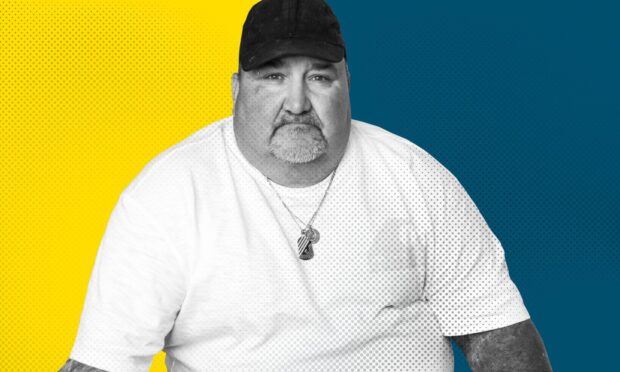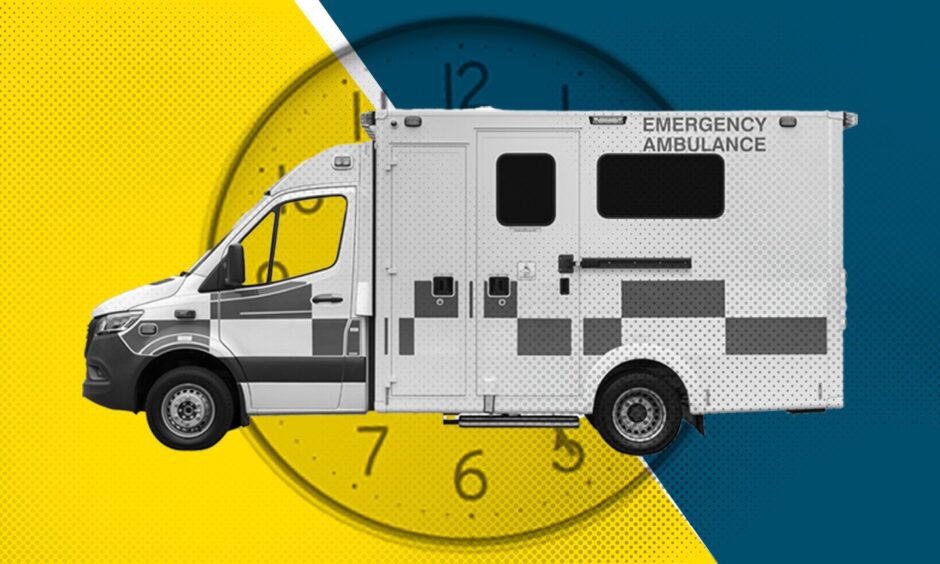A Dyce man who lay in the back of an ambulance outside hospital for EIGHT HOURS while suffering a heart scare has branded the ongoing queuing crisis as “a joke”.
Gary Dow says he feared his five children would never see him alive again after he endured the agonising wait on Wednesday last week.
Mr Dow waited so long in the back of the ambulance that the crew’s shift finished and they had to be replaced.
The 55-year-old, who survived a stroke last year that left him at risk of heart attacks, called for an ambulance in the early hours after suffering breathing difficulties and chest pain.
However, it took an hour for an ambulance to arrive at his home and take him to Aberdeen Royal Infirmary, where he was fifth in a queue of six.
Eight hours after Mr Dow arrived at ARI, he was finally admitted and fitted with a stent to correct the narrowing of an artery in his heart that was restricting his blood circulation.
“The wait to get into the hospital was a joke,” Mr Dow said and called on NHS Grampian bosses to work harder to tackle the ambulance stacking crisis at its hospitals.
‘I was worried about my children losing their dad’
However, he praised the “lovely” 999 crew and “excellent” hospital workers for saving his life.
It is understood that the cardiac episode was not a heart attack, when the blood supply to part of the heart is suddenly blocked.
Nor was Mr Dow’s condition as serious as a cardiac arrest, when the heart stops beating altogether.
However, for Mr Dow, the distressing experience, coupled with the long wait for treatment, filled him with fear and anxiety.
“I was worried about my children losing their dad,” he said.
“There were no beds available in the hospital for new patients. The wait to get into the hospital was a joke.
“I was in the back of an ambulance for eight hours before I was taken in and treated.
“I’m at home now, and I’m getting better, but it’s going to be a long way yet before I’m fully better.”
‘Absolutely ridiculous’
When Mr Dow phoned 999 at 2.35am on Wednesday April 30, the Scottish Ambulance Service (SAS) faced lengthy turnaround times for its ambulances at ARI.
It impacted the availability of ambulance crews in the community.
The call handler asked Mr Dow whether he could take a taxi or get a lift from a friend or relative to the Granite City emergency department.
However, an ambulance became available and conveyed the “nervous” patient to the A&E department, arriving around an hour after the 999 call.
They arrived at the hospital at 3.32am and the ambulance was only able to leave at 11.33am.
The ambulance crew had to wait so long with Mr Dow that their shift ended and a taxi had to be called to take them home when their replacements arrived.
Mr Dow explained: “The guys were due off at 7 o’clock. They had to send somebody else to come and sit with me until another crew managed to take over from them, and then they got taken away by a taxi back to the depot to get their own vehicles to go home, which was absolutely ridiculous.”
Hospital delays ‘prevent ambulance crews from getting back out on the road’
On Monday, The Press and Journal published the first part of its ongoing investigation into the state of the NHS, including survey results from over 1,200 of our readers.
Now, the findings of our probe into ambulance stacking, published today, reveal that nine in ten ambulances are queuing outside Aberdeen Royal Infirmary for up to nearly four-and-a-half hours.
An SAS whistleblower warned of potentially fatal consequences, telling this newspaper: “People are dying and getting harmed.”
People are dying and getting harmed – Scottish Ambulance Service whistleblower
A spokeswoman for the emergency service said ambulance patient handover delays at hospitals are impacting crews’ response times in the community.
She added: “It is extremely disappointing that despite extensive engagement with NHS Grampian, hospital delays at Aberdeen Royal Infirmary and Dr Gray’s Hospital continue to put significant pressure on the ambulance service across Grampian.
“These delays prevent our ambulance crews from getting back out on the road to treat other patients and can impact our ambulance response times.”
These delays prevent our ambulance crews from getting back out on the road – Scottish Ambulance Service
NHS Grampian responded, with a health board official explaining: “In the event an ambulance needs to be released urgently to attend an emergency call, we have protocols and systems in place to allow the rapid release of SAS vehicles.”
The spokeswoman added: “While we cannot comment on the care of individual patients, we welcome all feedback and would encourage anyone with a concern about the care they received to raise this with us directly so it can be appropriately reviewed.
“We would always encourage anyone who is experiencing a medical emergency to call 999 so that they can be assessed.”



Conversation